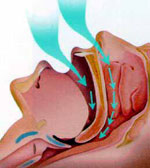|
The loss of
sleep and its day time consequences - such as drowsiness and
slow reaction time when driving- are sufficient reasons to seek
treatment. But in addition, research has linked apnea to a broad
range of cardiovascular problems, including hypertension,
strokes, heart attacks, arrhythmias, and heart failure, as well
as Type 2 diabetes, Stopping breathing for short periods during
the night can there are many other ways in which apnea may
damage blood vessels and the rest of the cardiovascular system.
New research, for instance, has linked apnea to chronic
inflammation, which is associated with heart disease. Since many
features of sleep apnea overlap with those of the so-called
metabolic syndrome (notable obesity, hypertension, and elevated
blood sugar). Some researchers believe that apnea should be
include as a part of the syndrome. |
|
|
» |
You’re male: Apnea is
more common in men than women. |
|
» |
You’re stacking on
extra pounds: Overweight and age increase the risk,
since these can lead to excessive relaxation of muscles
at the back of the throat. |
|
» |
You have a thick neck:
this physical characteristic seems to make it mire
likely that the airway will collapse during sleep. |
|
» |
You saw logs in double
digit decibels: Though not everyone who snores ad apnea,
loud snorers are most likely to have it. |
|
» |
You have same bad
habits Heavy drinking and use if sedatives can also
promote apnea. |
 |
|
Your doctor may prescribe CPAP, which stands for “continuous
positive airway pressure.” This air pump attached to a mask or
nasal tube is effective at maintaining a flow of air while you
sleep. Beside being expensive, it is cumbersome and noisy, and
many people find it causes nasal congestion and claustrophobia,
and thus stop using it.
There are also custom-made
mandibular advancement devices (made by dentists who specialize
in apnea) that pull the tongue and jaw forward while you sleep.
They are expensive, however, and a recent review found they are
not as effective as CPAP.
Surgery should be considered only
as a last resort. The standard procedure widens the airway
and/or corrects other physical problems contributing to apnea.
This is major, painful surgery, can have adverse effects, and
doesn’t help everyone. There are also less invasive options,
notably laser surgery, as well as the Pillar procedure, in which
three tiny inserts are implanted into the soft palate in the
back of the mouth. But since Pillar is relatively new, there are
questions about its long-term safety and effectiveness. |
|
|
 If
you aren’t sleeping well and snore loudly, or if you are tried
all the time despite what seems to be adequate sleep, talk to
your doctor about apnea- particularly if you have hypertension
and/or are overweight, you may need to see an ear, nose, and
throat specialist, who will refer you to a sleep specialist.
Most major Indian hospitals have a sleep clinic these days,
Spending the night in such a facility for special testing is the
best way to get sleep apnea diagnosed. There is also a home
testing device called the Apnea Risk Evaluation System (ARES),
which can be attached to your forehead to monitor your snoring,
blood oxygen, pulse, head position, and other factors, Available
only by prescription, the results have to be interpreted by the
company that makes it. If
you aren’t sleeping well and snore loudly, or if you are tried
all the time despite what seems to be adequate sleep, talk to
your doctor about apnea- particularly if you have hypertension
and/or are overweight, you may need to see an ear, nose, and
throat specialist, who will refer you to a sleep specialist.
Most major Indian hospitals have a sleep clinic these days,
Spending the night in such a facility for special testing is the
best way to get sleep apnea diagnosed. There is also a home
testing device called the Apnea Risk Evaluation System (ARES),
which can be attached to your forehead to monitor your snoring,
blood oxygen, pulse, head position, and other factors, Available
only by prescription, the results have to be interpreted by the
company that makes it.
If you have been diagnosed with apnea, do it-yourself therapies
such as the following should help, and may even resolve the
problem. These steps can also help with regular snoring.
| |
» |
If you’re overweight,
lose weight. Even a 10% loss can help. |
| |
» |
Limit or avoid alcohol,
especially in the evening. |
| |
» |
Avoid sedatives
(tranquilizers, sleeping pills, and some
anti-histamines). |
| |
» |
Avoid heavy meals in
the evening. |
| |
» |
If you smoke, stop. |
| |
» |
Elevate the head of
your bed with a couple or thick books or bricks under
the legs. (Don’t use a large pillow that forces your
neck to bend.) |
| |
» |
Sleep on your side, not
n your back. This helps keep your tongue from falling
back and obstructing the airway. Attaching a tennis ball
to the back of a pajama top is an old trick to help keep
you off your back. |
| |
» |
You can try one of the
inexpensive nonprescription devices that reposition the
lower jaw as you sleep. A little like the mouthpieces
worn by football players, these “mandibular advancement
devices” can cause mouth and jaw discomfort, however,
and don’t work for everyone. Consult your doctor first. |
|
|

